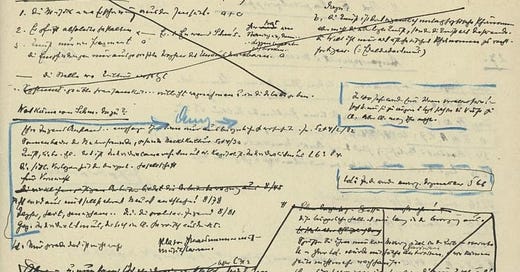I have been able to work the sausage machine, through which the novel must pass, more quickly . . . (July 31, 1929, to Franz Blei)
I am very depressed, and if bad times come or continue for Rowohlt [his publisher at the time], I will tie my manuscript around my neck and walk into the Danube (May 31, 1931, to Franz Blei).
I know neither how I might survive this crisis of intellectual Germany, nor do I see a circle of readers for whom I can finish the book, but simply write on like someone who strides out onto a broken-off bridge (August, 11, 1933, to Franz Blei).
The novel puts up a valiant resistance and throws me back whenever I hope to master it (December 2, 1934, to Klaus Pinkus).
Of myself I can only say that I have material troubles and that from time to time the novel affords a glimpse of the end, which then always grows over again. Naturally there are other things in my life, but it plays itself out as it does on a ship that is enclosed everyday within the same horizon: in a word, I spread the sort of heroic boredom one experiences on the sea all around me and find myself inside it; luckily together with Martha, who understands (June 4, 1935, to Franz Blei).
[M]y work is like a string of glass beads that breaks three times every day (letter to Otto Pächt, September 3, 1936).
For the time being, I have wrapped myself in work as in a thick coat (April 1, 1937, to Erna Fürst).
The work goes well, that is at the highest racing pace of a snail! (July 1937, to Otto Pächt).
[T]he recurring confirmation that I can only work in the countryside and when there only in pleasant rooms and in a beautiful environment, without awakening the passion for walking. By the way, everything still exhausts me to an unbelievable degree; obviously I wore myself threadbare in the winter again (July 1937 to Bruno Fürst).
Since the spring, when I changed over from Rowohlt to Bermann-Fischer, and was forced to bring a continuation of my novel to completion —since I simply am wearing a sack over my head—I am not in any condition to fulfil my duties to friends or humanity (To Johannes von Allesch, February, 1938).
I can’t report anything more about myself than that I still have the Man Without Qualities hanging on me like a pair of handcuffs; I have not gotten any further with the book, but I hope: deeper. And since you say friendly words about me, I would like to respond that it really is the most important thing to me. In this way it is something similar to a self-affirmation of literature itself in the face of the all-too-virulent forces of reality. If I withstand it, I will be satisfied; but in addition to the moral afflictions there are the material ones; for almost no one cares about me and naturally no one enough, and I sit about as comfortably and secure as a spider web on a wall—a web whose strands are always breaking apart again (December 23, 1938, to Victor Zuckerkandl).





I wonder: how much of his creative writing problem is due to the politico-economic crisis he was living in?